Ukraine, Russia and the Bending of History - Part Two: Alcohol, Antisemitism and the Arenda
Deep State Tim Snyder show us how it's done in the Ivys - and this time he has help
The second part of this series of articles will analyze lecture 8 of Tim Snyder’s Yale Ukraine history course and focus on the Jews during the first half of the period in question, that roughly the 14th to the 19th century, which will take us to the Khmelnitsky revolt in Ukraine in 1648. Because Snyder’s course is on Ukraine and because during this period what is thought of as Ukraine fell increasingly under the control of the Polish side of the Polish-Lithuanian Commonwealth, this piece is also going to be about Poland. One thing to remember is that the history of Poland and the history of Ukraine during this period are kind of the same thing. And that this also basically encompasses the history of Jewry at that time, which we’ll get to.
As pre-introduction I’ll replay what Snyder said about this lecture at the beginning of the last part, which will be the last of Deep State Tim you’ll see in this piece:
Schlep. So we see that for some unstated reason Snyder had to do that lecture, and that again in an unstated manner meant that this Jewish professor at Sarah Lawrence College was enlisted to do this next lecture - but Snyder emphasizes that it’s just a bodily substitution with no further consequence. Even with that I think we do need to look at Dynner - from his wiki:
Glenn Davis Dynner is an American author and historian specializing in religion and history of East European Jewry. He is the Co-Editor-in-Chief of Shofar: An Interdisciplinary Journal of Jewish Studies and a Professor and Chair of Religion at Sarah Lawrence College (Chair of Humanities, 2014-16). Dynner received his B.A. in Comparative History from Brandeis University in 1993, his M.A. in Jewish Studies from McGill University in 1997, and his Ph.D. in Near Eastern & Judaic Studies from Brandeis University in 2002 (supervised by Antony Polonsky). He works primarily in Polish, Yiddish, and Hebrew sources on the Jewish social and religious history in Poland, and specializes in the Hasidic movement.
Just to add more depth, from Polonsky’s wiki:
Antony Barry Polonsky is Emeritus Professor of Holocaust Studies at Brandeis University. He is the author of many historical works on the Holocaust, and is an expert on Polish Jewish history. Polonsky was born in Johannesburg, South Africa to Lithuanian Jewish immigrant parents who arrived in South Africa in the late 19th century. His father was from a Yiddish speaking family from near Grodno (in modern Belarus) and his mother was from a Russified Jewish family from Lithuania. Polonsky was not raised in a Polish speaking background.
So I think we can draw two things from this: Dynner knows of what he speaks, and he is a totally self-identified Jew likely with every square millimeter of his skin in the game. Oh, and I should mention that his father was a senior executive at an investment management firm, so there’s the usurious bloodline. 😉
As part of the intro to this series I included a clip of E. Michael Jones doing a very brief summary of the history of the Jews in Poland, the Paradius Judaeorum. Here I’ll start with a page from his 2009 The Jewish Revolutionary Spirit from chapter 11 (first edition) Mennaseh ben Israel and the Failed Apocalypse (which is ultimately about Shabbetai Zevi), in a section titled The Polish Oligarchy and its Expansion (apologies in advance for the photos, but I’m too lazy to retype it all):
Note that the start of Pogonowski’s definition of the golden age of Polish Jews corresponds to the year of the start of second serfdom in Poland, hardly coincidental, and it extends to the start of the Khmelnitsky revolt, the revolt of the Ukrainian serfs. Btw, I would hope that you can hear echoes of 21st century America in this description toward the end. I will continue to use Jones’ history as a comparison to that of Dynner. So let’s get to his introduction and opening:
So this guy’s entire existence would seem to be about Jewishness, he has made that his life. That does make him an expert, no question about it, but we also have to consider the kind of bias that this may bring to the matter - how much scholarly distance exists between the man, the Jew, and the topic, the Jews? Btw, his surname is Russian and is most common in Russia, Ukraine and the US, in case you were wondering.
Moving on to his summarizing of the situation and the Jewish role:
Ostensibly: in a way that appears or claims to be one thing when it is really something else.
“They have to somehow mediate between these colonizers and the colonized.” From there I hope you can see, or at least will see by the end of this piece, how he’s steering his ship in a certain positive direction for Jews. But what is clear here and will become more clear is that we have three basic groups: the essentially-Polish nobility, the peasantry or serfs in this period (both Ukrainian and Polish), and the Jewish middlemen. To give you a better feel for the geography operating here, a map of the commonwealth overlaid on current borders:
So the majority of Polish territory was actually in today’s Ukraine. Because this course is about Ukraine one might get the impression that the enserfed peasantry was all Ukrainian, the colonized, but serfdom existed as much in Polish Poland. This was emerging class conflict as well as colonial conflict.
Btw, what’s labeled as Rus there is Russian Kaliningrad, which used to be part of East Prussia. This is after the bulk of post-Kievan Rus shifted from Lithuanian to Polish control; here is that territory designated:
Next Dynner teases into the requisite “the people what killed our Lord” bit before getting into some detail using an image:
Ambivalence: a state of having simultaneous conflicting reactions, beliefs, or feelings towards some object. Stated another way, ambivalence is the experience of having an attitude towards someone or something that contains both positively and negatively valenced components.
Symbiosis: a close, prolonged association between two or more different organisms of different species that may, but does not necessarily, benefit each member.
First, that image, which reminded me of this one which I’ve used in the past:
The impression he leaves is that the peasants are somehow above the Jews socially and economically. But he also gets to something that both Jones and Himka talked about in clips in my first part, the Jewish role in production and sale of alcohol, the purchase of which Himka said was mandated upon the serfs, and that reminds me of another image I’ve used in the past:
Thinking back to what Himka and Jones said in the clip in my first piece, do “ambivalence” and “symbiosis” seem like the right terms to apply here? Would those terms be something that you’d apply to, say, the Jim Crow south of a century ago or so?
Or perhaps this is a more appropriate image:
At this point Dynner is starting to warm to his task:
I could write an entire article on what he said in just over three minutes, but I’ll mostly avoid that temptation. What he said at the beginning was a modus vivendi that Jones has cited repeatedly, Sicut Judaeis Non, which was a kind of two-way deal:
But Dynner applies his own spin to this, that the Jew was to be an example of misery for the Christian, and the problems began when the Jew failed to stick with this role. He uses the Roman emperor’s statement based on the Church fathers’ earlier statement, and that leads him to his use of Holocaustism with the genocidal tendencies of the goyim.
To provide more than equal time, here is what the Times of Israel said about this back in 2019:
Jones invokes the Catholic teaching of Sicut Judaeis Non, a doctrine of the early church that stated no one had the right to harm the Jew, but at the same time, the Jews were — like Christians and Jews living under Islam — required to accept second class status and refrain from undermining the Christian cultures in which they lived. What Jones does not address, however, is how this doctrine is to be applied in countries with secular civil societies. Nor does he describe what happens when Jews achieve political and cultural success in these societies.
Boiled down to its basics, Jones’s message is “Don’t attack the Jews (no matter how badly they deserve it!)” but after a few iterations and echoes, Jones’s message is reduced to “They deserve it!”
Jones and his listeners know full well what he’s doing: creating an atmosphere of anti-Jewish hostility in American society which — if left unchecked and unchallenged by his fellow Catholics — will result in further acts of violence that Jones and his followers will inwardly applaud even as they repeat “Sicut Judaeis Non.” (For those who think it’s unfair to guess at Jones’s interior response to attacks on Jews, he has attributed the same feelings to Jewish leaders by suggesting they secretly rejoice at these same attacks because they demonstrate the legitimacy of their concerns about antisemitism.)
In fact what Jones has done most of all is to “describe what happens when Jews achieve political and cultural success in these societies”, in gory detail, today most focused on the inexplicable levels of US government support of Israel’s genocidal war on Gaza. And in fact well over half of Americans are Protestant or come from that tradition, while another quarter are Catholic - do these people not have any right to their culture? Have Jews had some inalienable right to engage in “undermining the Christian cultures in which they lived” as a small minority?
Okay, time to move on:
I’ll get to the matter of language later on when Snyder comes back on the scene, but an interesting bit here is his “state within a state” and the system of the nobility leasing economic activity to the Jews, which is “arenda” - Jones’ description:
Here is part of what the Jewish Virtual Library has to say about arenda:
Arenda is a Polish term designating the lease of fixed assets or of prerogatives, such as land, mills, inns, breweries, distilleries, or of special rights, such as the collection of customs duties and taxes. The term was adopted with the same meaning in Hebrew and Yiddish from the 16th century (with the lessee, in particular the small-scale lessee, being called the arenda). The arenda system was widespread in the economy of *Poland -Lithuania from the late Middle Ages.
I. Great Arenda
This term refers to the lease of public revenues and monopolies. The first leases to be held by Jews were of royal revenues and functions: the mint, salt mines, customs, and tax farming. Large-scale operations of this type were conducted by the Jews Lewko (14th century) and Volchko (15th century). The number of Jewish lessees of central and regional customs duties and of salt mines increased in the 15th century, especially in the eastern districts. Often the same persons leased both the customs and the mines. In western Poland the nobility, possessing more capital, prevented Jews from leasing royal revenues, this being a highly lucrative activity…
It goes on from there to talk about the balancing act between the Polish nobility and the Jewish financial elite.
Next, for those who are interested, Dynner addresses the Khazar theory:
Me, I don’t believe that Khazarian blood is significant in the Ashkenazim and I don’t care about this theory, I think debating it is a complete waste of time. I should say that I’ve heard Jones say things that suggests he believes it, or at least promotes it, but he doesn’t mention it in his book, and twice he cites Arthur Koestler, the author of The Thirteenth Tribe which promotes it, but neither time in any way related to this.
Skipping a bit on the early days of Jews in this area and the Lithuanian assumption of control brings us to the Polish takeover of these lands, the welcoming in of Jews for economic purposes and more on the arenda:
So hopefully you can see that he’s describing a situation that I have no reason to think isn’t in a general way historically incorrect, but he’s doing it in a manner that always favors the Jews and casts shade on the Christian nobility and peasantry instead. And it’s all caused by Russia (Muscovy), of course, that threat to Lithuania turns over Ukrainian lands to the greedy Polish nobles and their Jewish peons.
On money lending, he says Jews “represented easy credit”, but that's because of the usurious rates of interest Jews charged; Catholic money lenders were limited in the interest they could charge because of the church’s prohibition on usury. Obviously the availability of high-priced loans is going to be much greater than low-priced ones.
More of that:
So why were the Jewish merchants pushed out of western Europe, and what traditions/habits did they bring with them? They can’t own land because of the “optics” of “lording it directly over peasants”? Seriously, under fucking serfdom, of colonized Ukrainians?? Do note the way he plays down serfdom, which is basically slavery.
Now that he’s fully warmed up he continues to spin his tale:
There at the beginning you can see the absurdity underlying this story - the nobles don’t want the headache of trying to collect taxes from the untrustworthy Jews, so they put the Jews in charge of tax-collection from the peasantry! We can’t deal with these people, so let's just put them in charge!
And then the bit about blood libel, which of course never, ever happened, just more Christian antisemitic mythology. Because apparently history can prove a negative. And Leo Frank didn’t rape and murder that 13-year-old girl in Atlanta either, right? Quite possibly Mendel Beilis didn't do that ritual blood-letting murder of a 13-year-old boy in Kiev two years before - but someone did.
What we do see here is this massive growth in Jewish influence and power over the society anyway, including the court system - which then in turn cedes certain matters to the rabbis to decide.
And note: “This is kind of like Jewish foreign policy [ie: neoconservatism], this is how they defend their communities, through lobbying and, yes, through giving of bribes” - see the Israel lobby and Gaza: “this is the normal way of doing business”. The more things change…
But “a state within a state” is going “way too far” - remember that? In fact it's not just too far, it's downright antisemitism according to Dynner. You know, like dual-loyalty. So if you talk about Jewish power in Ukraine then it's like talking about Jewish power in the US today, it's just antisemitic fabrications.
Also note what were the “Four Lands”: Great Poland, Little Poland (which includes western Galicia), Volhynia and Red Ruthenia, which is basically eastern Galicia.
Skipping over the religion bit, he gets back to arenda, and the Paradisus Judaeorum, the paradise of the Jews:
I believe that Snyder had said that at some point the nobility at all its levels reached about 10% of the population (or at least that the level of suffrage reach that), the Jewish population was almost certainly less than that, and the rest were peasants and/or serfs, the vast majority of the population who are living in “hell”.
Note urban economics and “Christians against Jews”, but no Jews against Christians. And the cost to the poor Jews is the cause of the rise of arenda, which is an absolute boon to the Jews economically. Wow, that was a lucky bounce!
Also note the slippery bit about the “lore” of leasing churches, and compare that to what Jones said above. So who’s right? I don’t know - and neither do you. But I have my suspicions…
When I heard this bit I wondered if there is any cultural connection between that and this:
Of course what second wave feminism theoretically/psychologically did was to double the workforce, at a time when that was completely unnecessary, and so the impact was ultimately to suppress wages, and that means wages of men, who previously were the workforce. What worked economically for a small minority in a privileged position centuries ago in Poland hasn’t really worked for the whole population in the contemporary US.
Also think about peasant children out in the fields with their fathers or at home with their homemaker mothers (assuming they weren’t also in the fields), while Jewish children are growing up in the taverns, stores, etc. with their “working” mothers, and consider Jewish society being matrilineal as well. Think about the impact of that on Jewish culture.
Jumping ahead past some details on the rabbis and how the economic politics worked:
Remember that Himka said that the serfs were required to buy a certain amount of alcohol, but Dynner says nothing about that, instead he subtly suggests the Jews were being falsely blamed for peasant drunkenness and resulting debt. Imagine trying to get away with taking that kind of line about slavery today.
And then he makes a big deal of Jews hiring gentiles to work their bars on their day of rest as Jewish-peasant “cooperation”, because Jewish law required this to somehow be framed as a partnership. Seriously?
Finally Dynner transitions into his last bit, on the Khmelnitsky revolt and then the rise of the Jewish false messiah Zevi (who apparently converted to Islam after being challenged to rise from the dead), and his concluding remarks.
Dynner claims Khmelnitsky’s grudge was against the Polish nobles who couldn’t be reached, so they went after the Jews as their agents, unwitting proxies. But is that really the truth? Go back and listen to Himka on the role of the Jews in serfdom, and serfs escaping to the Zaporozhian Sich in the east. We’ll get to Jones’ view of Khmelnitsky’s grudge in a moment.
So the system broke down - but that resulted in the seed of Ukraine, once Khmelnitsky’s runaway-serf forces aligned with “Muscovy” or Russia in 1654, as is reflected on this map, and the more complex map on the history of various areas of Ukraine (which Snyder and I will get to eventually), especially in the west where the Khmelnitsky pogroms mostly took place, and which in my opinion held the seed of Ukraine today:
The system only broke down if you look at it from a Jewish standpoint, which seems to be the only thing Dynner can do, at least not grudgingly. This is kind of like addressing the American Revolution from London and saying it was just a case of the British colonial system breaking down, rather meaningless. Then more symbiosis.
But let’s compare this to what Jones had to say about these same two things, Khmelnitsky and Zevi:
Jones uses the German Jew Heinrich Graetz as a source there, and here you can read more about what he had to say about the causes of the uprising and the nature of it. That includes things like this:
A love of twisting, distorting, ingenious quibbling, and a foregone antipathy to what did not lie within their field of vision, constituted the character of the Polish Jews. Pride in their knowledge of the Talmud and a spirit of dogmatism attached even to the best rabbis, and undermined their moral sense… The magnates wished to make profitable serfs of the Cossacks, the Jesuits hoped to convert the Greek heretics into Roman Catholics, the Jews settled in the district expected to enrich themselves and play the lord over these pariahs. They advised the possessors of the Cossack colonies how most completely to humiliate, oppress, torment, and ill-use them; they usurped the office of judges over them, and vexed them in their ecclesiastical affairs. No wonder that the enslaved Cossacks hated the Jews…
Here is what gets quoted on Khmelnitsky’s grudge against the Jews in that piece:
Chmielnicki…had been vexed by Jews, when he held the subordinate position of camp secretary (Pisar) of the Cossacks subject to the house of Koniecpolski. A Jew, Zachariah Sabilenki, had played him a trick, by which he was robbed of his wife and property. Another had betrayed him when he had come to an understanding with the Tatars. Besides injuries which his race had sustained from Jewish tax farmers in the Ukraine, he, therefore, had personal wrongs to avenge. His remarks to the Cossacks, “The Poles have delivered us as slaves to the cursed breed of Jews”, was enough to excite them.
But Dynner doesn’t tell that story, rather the Jews are once again forced to perform “bloody mediation” between these two groups.
I assume the difference in the numbers is that Dynner was addressing Polish Ukraine and Jones was addressing all of Poland including Lithuania, if not all of eastern Europe (which for Jews didn’t mean much else - they weren’t allowed in Russia, for the most part). But who knows.
In that closing on the pogroms Dynner describes some of the horrors in writing, cats put into bellies and such (he won’t say it out loud), but this was 1648 - if 300 years later one could tell stories like those evidenced on the Buchenwald display table below and get away with it, why should we believe these tales of gore from centuries ago? That's without getting into mass rape and beheaded babies only a few months ago - the Jew can tell any story of atrocities and you’re simply obliged to believe it. And what that does is to turn the Jews from participants in what are simply two-way conflicts over resources, etc. into victims, which completely tilts the playing field.
Also note the source of his population figures - dual-citizen settler Prof. Shaul Stampfer, descendent of Yehoshua Stampfer.
I shouldn’t piss on Stampfer too much, he has explained his view on calculating the numbers, as he does here - again, equal time:
Btw, just before the point I linked that video he gives his take on the Khazar theory. Oh, and note that he cites Babi Yar at one point as an example of the difficulty in killing large numbers of people - an event that I view as highly dubious in itself, and for that very reason.
I will also note that Dynner said 75% of the world’s Jews then lived in Poland (including Lithuania and some trimmings) and Jones said 80% lived there - today 75-80% of the world’s Jews live in Israel and the United States. This underlines the importance of that time in terms of the development of Jewish culture and mythology, and how that is reflected in today’s world, including in both Ukraine and especially Gaza.
The last thing to address in the lecture are the expanding incidents through time of murderous antisemitism he mentions, culminating in the Holocaust. His explanation is further breakdowns in “the system” of the nobility and their “symbiosis” with the Jews, even though Poland disappeared off the map nearly a century before that all began. Most of Poland ended up in the Russian empire, which didn’t have this same “enlightened system”, but something else also happened there - the end of serfdom in 1861 (Austria ended it in 1848, and Prussia way back in 1810).
Snyder will get to that later, but that created a kind of competition over the loyalty of the masses of freed serfs, and one of the groups who came to the table were the Jews, by then armed with Marxism. That didn’t stop the pogroms, which surely were in part the result of other Jews continuing with their old economic ways but no longer with the protection of the Polish nobility. But that future will have to wait for another day.
The two most significant takeaways from this lecture are:
How fundamentally important the Jews are as one of the three cultural groups operating in conjunction in Poland/Lithuania/Ukraine during this period, and that won’t change going forward in time. Yet they have been mostly carved out of the story by Snyder and are instead compartmentalized into this one lecture, and if that trend continues (I haven’t looked beyond lecture 12 yet) one assumes there will at least be another lecture that will address the Jews from Khmelnitsky to the Holocaust 300 years later, and otherwise they’ll mostly be erased from the story. Snyder doesn’t really talk about the peasantry that much either, so that resulting story would be mostly about the gentilized elite - but one assumes as victims of the Russians and not victimizers of the Jews.
We can see throughout this the way that Dynner tilts the story toward favoring the Jews, at a cost to the goyim and/or a cost to history itself. Just one example: more than once he addressed something that was negative regarding the Jews and it became disputed history or goy mythology. Whoever is more correct, there is no question that there is a meaningful difference between the history (his story) of Jones and Dynner. And it would be beyond silly to just assume Dynner is right and Jones is wrong, about everything. That Himka’s story differs from Dynner’s in important ways as well suggests that to be the case - Himka is no “antisemite”. And we can only guess at what Snyder might have had to say, had he done the lecture instead.
Maybe the best analogy to this lecture would be a comprehensive history course on the deep south in America that includes almost nothing on blacks, but then one lecture is set aside for a self-identified black professor to give a talk on slavery. Except even that doesn’t really come that close to what we have here, because black slaves were so much more like the serfs than the Jews, and on top of that they never really revolted. Well at least not until a century after slavery ended, when they were egged on by the Jews…
Another analogy useful here might be that history is a two-sided coin, the Jew shows you one side, and you’re not allowed to see the other because you’re told all it has on it is antisemitic slurs.
But the one sort of historical theorem we can perhaps draw from this place and time is that good times for the Jews means bad times for almost all of the rest of the population - this is Pogoniwski’s golden age of the Jews, starting with the start of serfdom and ending with a peasant revolt against that the consequences of that. Which is kind of the definition of a parasite, at least until it goes too far and cripples or kills the host, or becomes such a threat that it is itself killed off. In the case of Poland, by 1795 and the third partition the host was truly dead and gone.
And before some of you overreact to that, remember it was Dynner who established at the start that the Jews of Poland were “guests”, and those guests had to manage the process of being welcomed exploiters, and “mediate” their relationships with the titular rulers and the exploited masses.
In any case it's Dynner’s history that counts, because it's being taught to America’s future elite, and not a bunch of buckaroo Canucks like Himka’s, or a bunch of self-educating antisemites like Jones’. And more’s the pity…




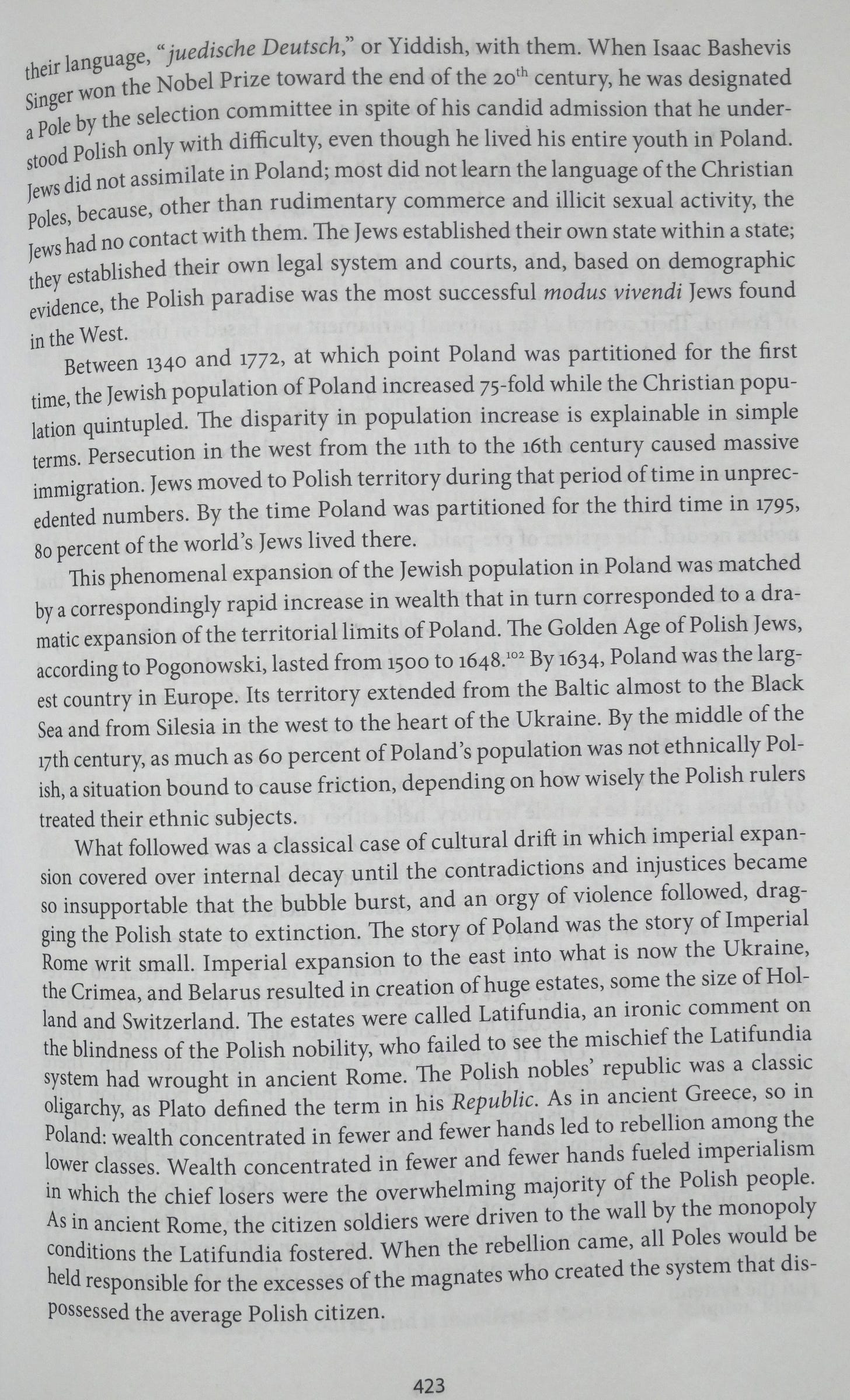

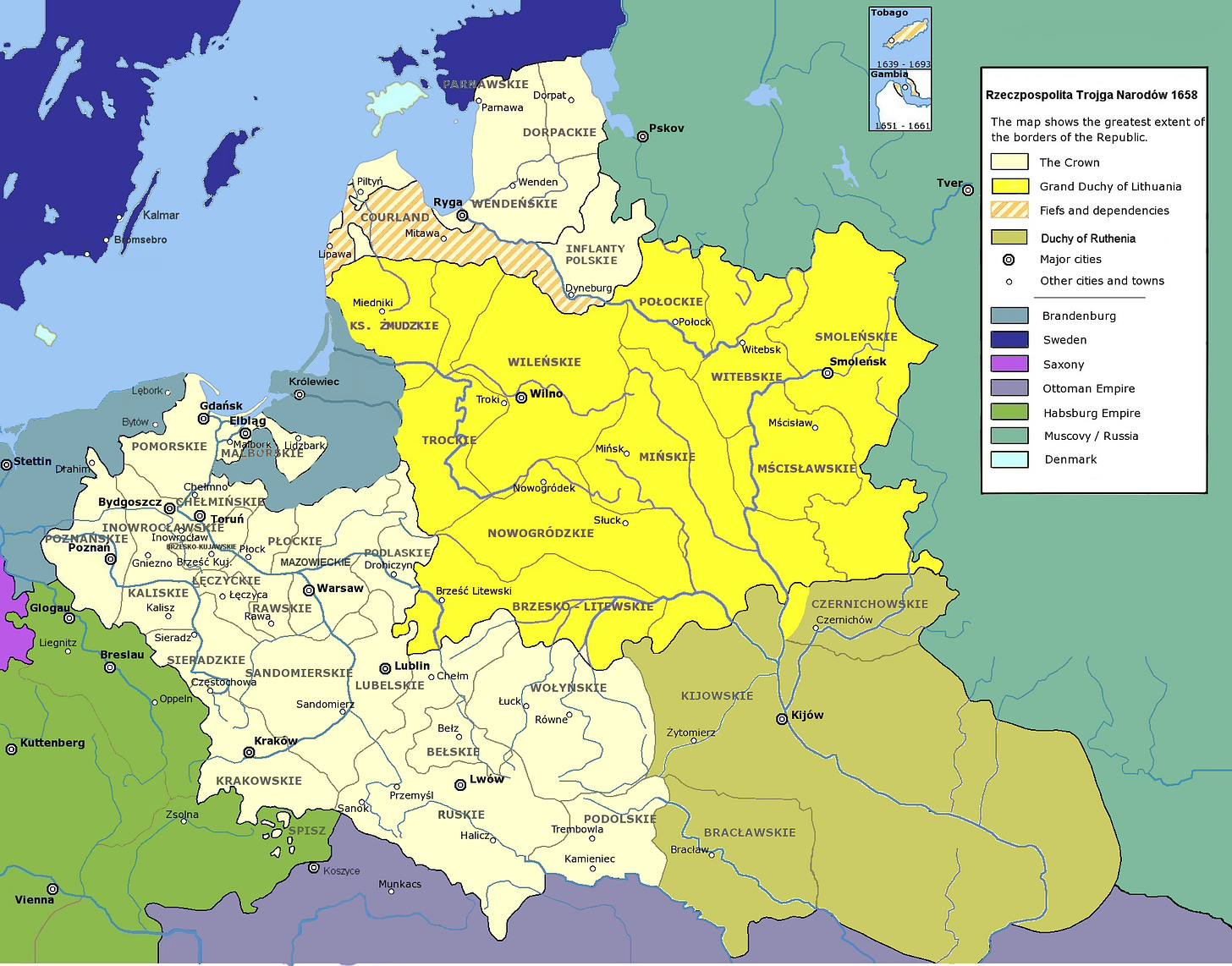
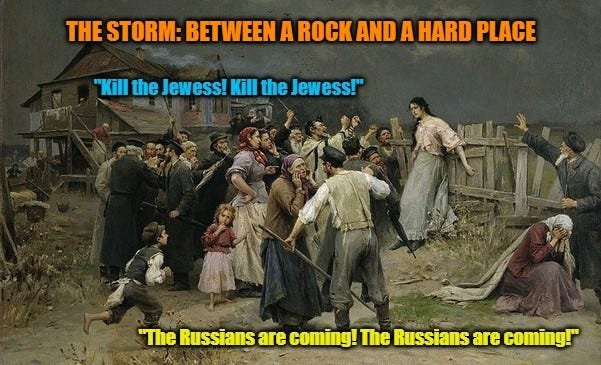
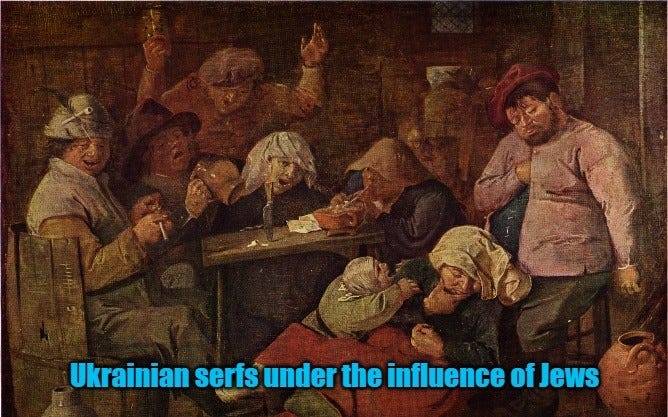

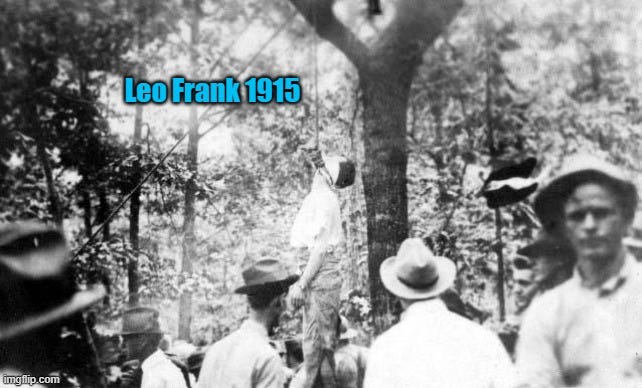






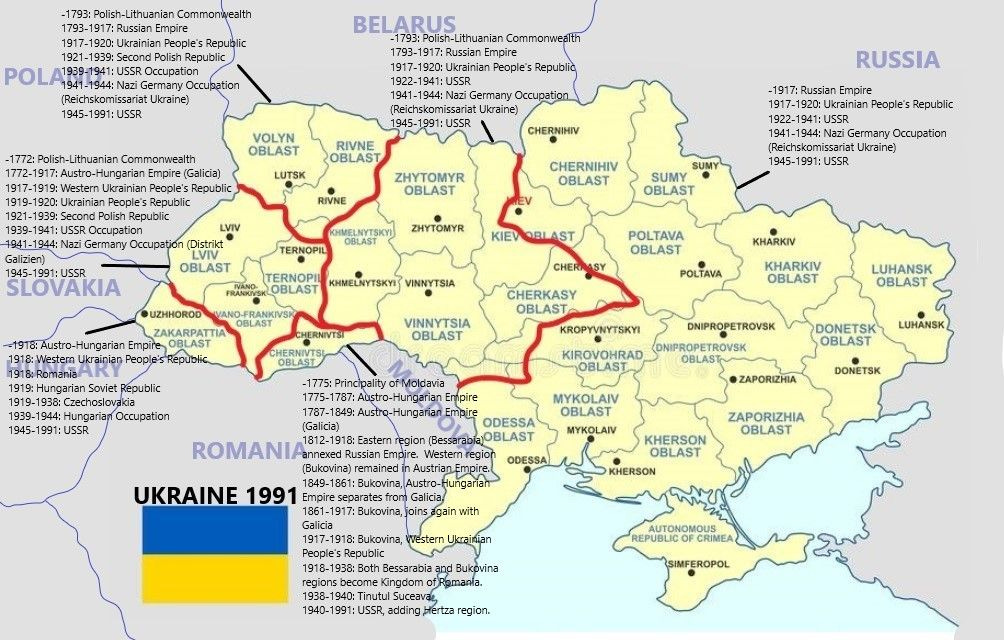
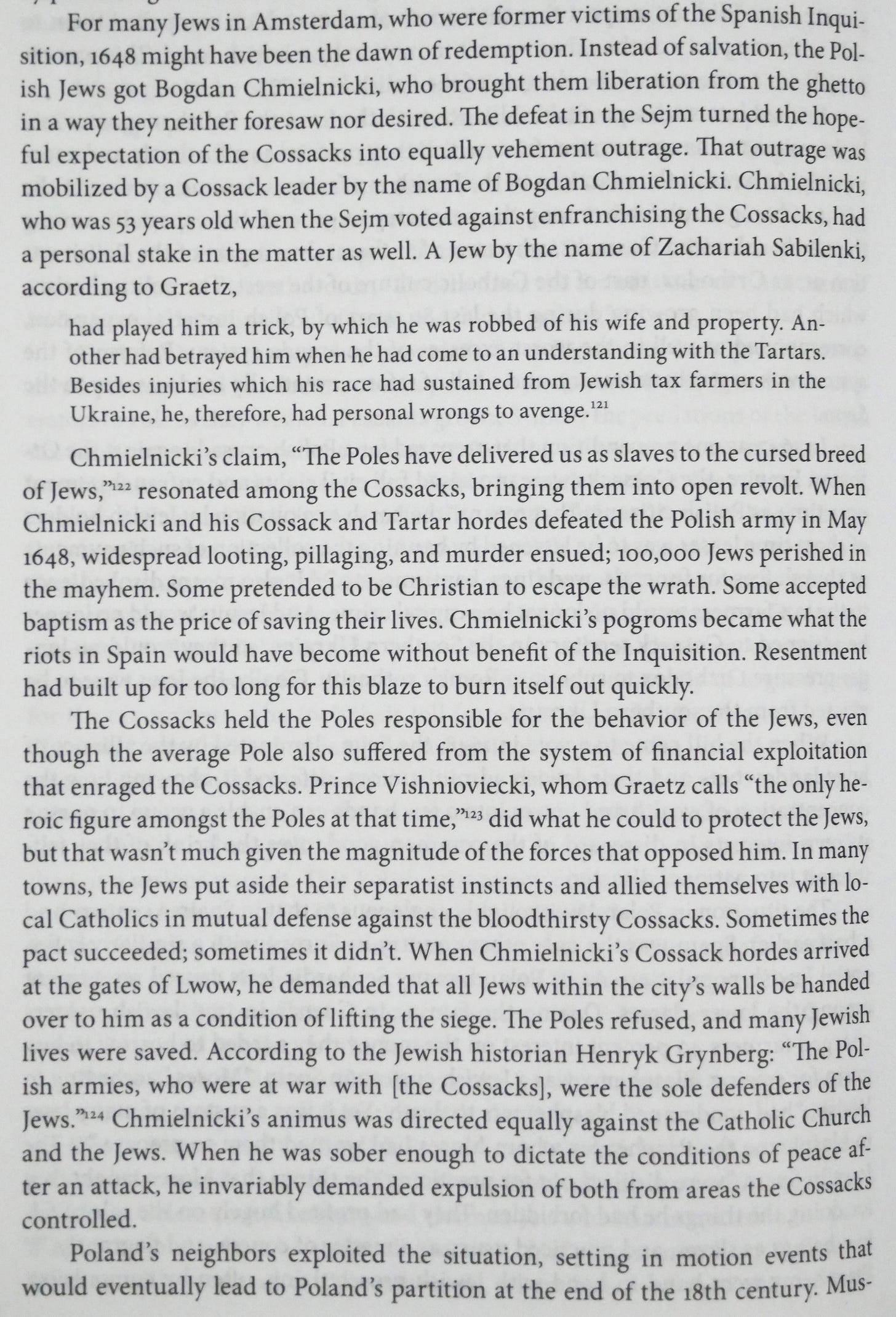

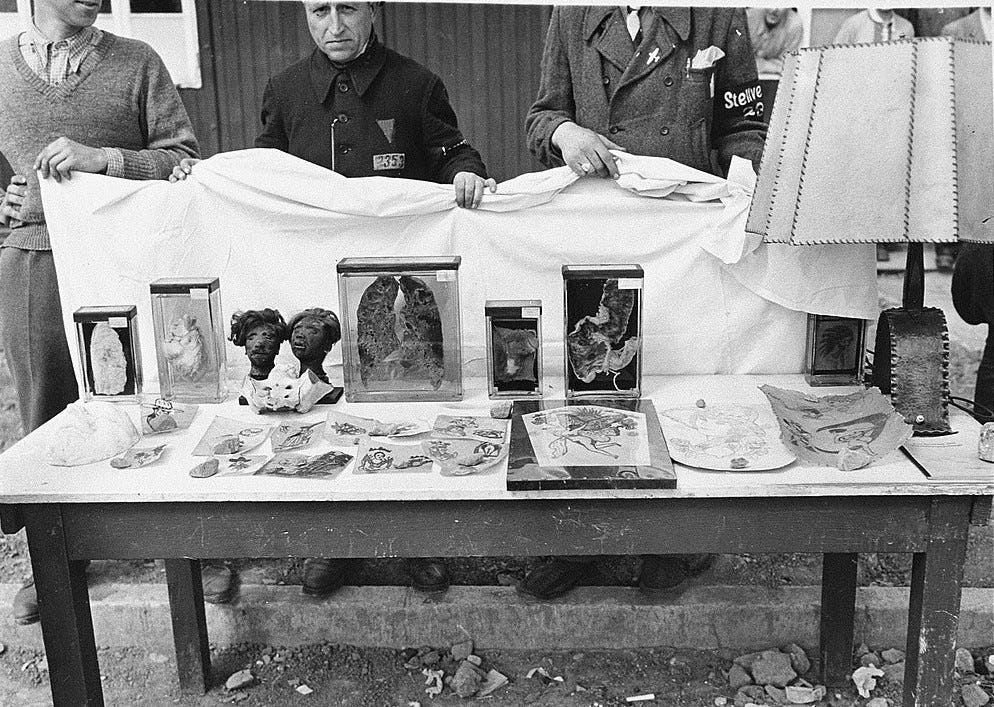



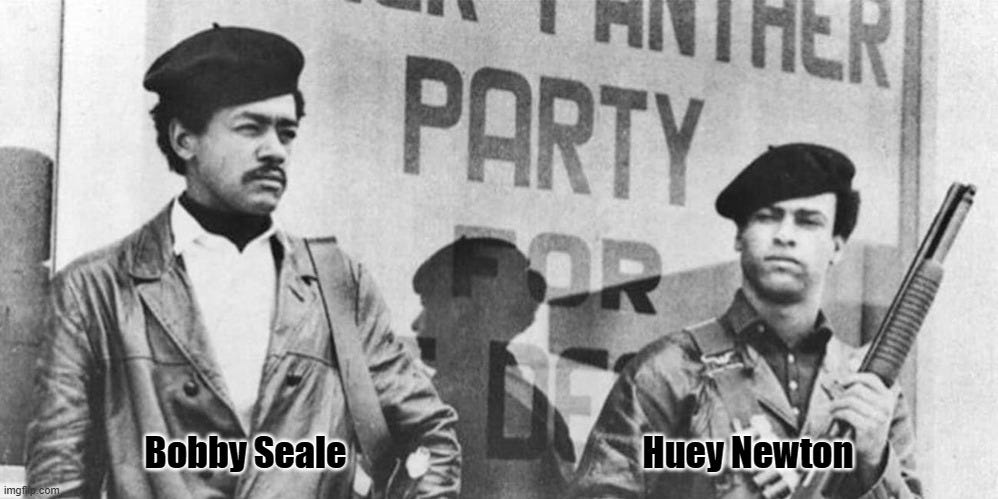


havn a secretly-gendered spouse, might be a "control file" / collateral for an officed risk.
https://twitter.com/DANIELO90129647/status/1769900306358210836 Ayala is a descriptor that gets around.